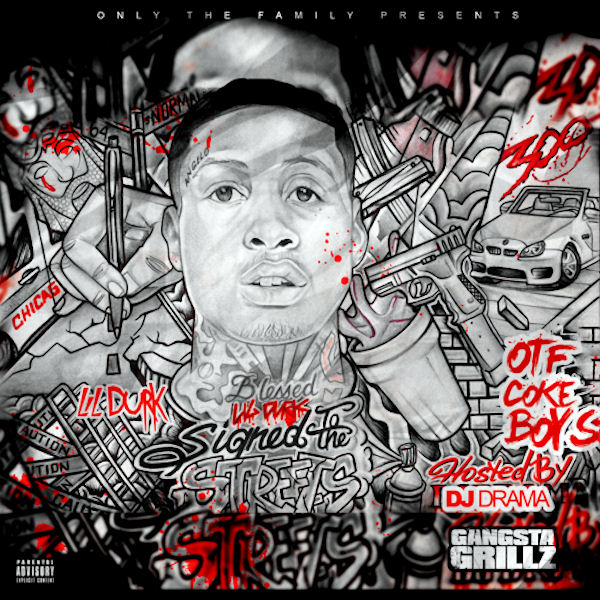Chicago teenage-nihilist-rap fatigue is a very real thing. Last year, in this space, I recommended Lil Reese's hard-as-hell tape Don't Like, shortly before a video of Reese beating the shit out of a girl materialized on the internet. And even if that kind of thing doesn't have an actual bearing on the music, I never listened to the tape again, and I felt bad for talking the guy up. If you've had nice things to say about Chief Keef, you might feel a bit of that inward wince every time he gets sent back to jail or does something fucked up on Twitter or Instagram. And extramusical factors aside, there's a good chance that the the dead-eyed burn of all Keef's various drill-scene associates, guys who still clutter up DatPiff's front page, has started to wear on you. (Or maybe you always thought Keef was garbage; plenty did. But if you've never felt the grim grandeur of "Don't Like" or "Love Sosa," you probably haven't even read this far, and I'm not really talking to you.) If that's the case, you've probably started to look within drill for signs of lively emotion, like Katie Got Bandz, or you've given up on the subgenre entirely. I get that. But Lil Durk, the Def Jam signee who turns 21 later this month and who was incarcerated on a weapons charge during much of Keef's rise, deserves your attention anyway. His new Signed To The Streets, which crashed DatPiff on the day of its release, has the tough-minded energy that made so much of that drill stuff exciting in the first place, and it also has other things working for it: Hooks, songcraft, emotional force, a sound of its own. If you've been mentally filing Durk away in the ranks of "guys who stand behind Keef in videos," it's time to stop that.
Durk can straight-up rap when he wants to, and on the Signed To The Streets track "52 Bars Pt. 2," he sounds, probably intentionally, a whole lot like Meek Mill. Mostly, though, straight-up rapping is not an activity that interests Durk. Instead, he belongs very much within the post-Future zone of, say, Rich Homie Quan. Instead of rapping, he tends to sing near-atonally, through robotizing levels of Auto-Tune, and letting his voice crack with feeling. That's a potent formula, even when he isn't saying anything that sounds particularly emotional. On opener "Traumatized," he's sing-rapping about leaving other people traumatized, but the way he repeats to word over and over on the hook, he seems to be talking about himself, like Danny Brown on "Torture." The single "Dis Ain't What You Want" has a similarly simple don't-fuck-with-me message, but it all builds to the part where Durk affirms that this is what he wants. And even when he's just snarling, there's a mesmeric swirl in the way he layers his voice, and a rough power in the way he saves his words for when they'll have the most impact.
Keef actually does something like this on his own new tape Almighty So, which is a vast improvement on his massively sloppy two-month-old Bang Part 2 but which still fails to equal the impact of his earlier records. Keef seems like he's trying to make "Love Sosa" again and again, growl-crooning over fake-orchestra churns, trying to use melody to convey all that curled-gargoyle charm. But Almighty So, while solid enough, sounds like it's out of ideas, and his hooks don't have the same melodic punch of Durk's. That's partly because Durk has more to say, as on the seen-it-all veteran laments of "Introduce Me," a great old-before-my-time koan. But he's also working with more interesting music. Like Keef, Durk does some of his best work with the producer Young Chop. But Chop's beats for Durk aren't elemental stomps; they're either floating near-cloud-rap twinkles ("Bang Bros") or runaway-train clapfests ("52 Bars Pt. 2"). Zaytoven, the king of Atlanta dinky-synth rap, has a strong beat on the tape, too. But Durk's greatest collaborator is the wonderfully named Paris Beuller, whose drop works as a not-bad Ben Stein impression. Beuller's tracks are a warmer, friendlier, busier take on Chop's ferocity. Little pieces of trance-rap melody come through, but they're cut into bits, riddled with frantic snares. Between his tracks and Durk's roughed-up singing, Signed To The Streets sounds like a new, different mutation of that drill sound, a way past that fatigue.
Download Signed To The Streets here.
[videoembed size="full_width" alignment="center"][/videoembed]
[videoembed size="full_width" alignment="center"][/videoembed]






